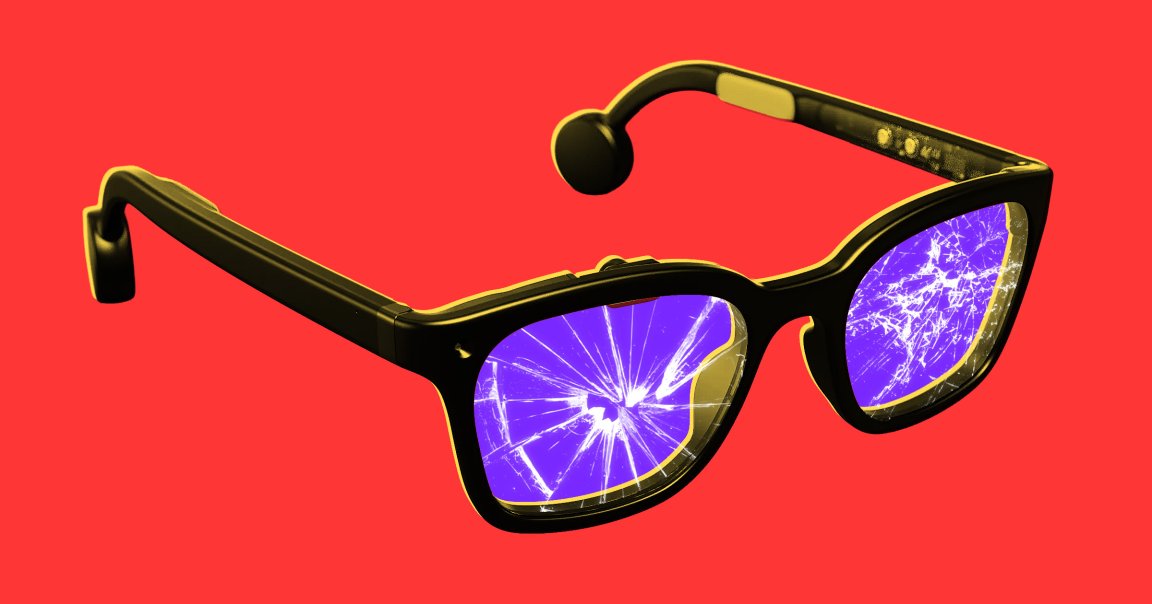
Are you looking forward to a future of casual but supercharged surveillance, in which inconspicuous wearable devices record everything private you do — ostensibly in service of making you “super intelligent?”
Evidently, readers, you are not.
Users on social media have responded with horror and outrage to a pair of smart glasses developed by a startup called Halo that its creators, a pair of Harvard dropouts, claim will feed you live AI-powered insights while logging and transcribing every conversation you take part in. So transformative will it prove to the human brain, the twenty-something-year-old inventors promise, that wearers will soon be not just thinking, but “vibe thinking.”
Many were quick to raise alarm over the obvious nightmare this would be for personal privacy — not just for the wearers, crucially, but anyone they interact with.
“Have you ever read a description of the panopticon, a theoretical prison where one guard can see every prisoner at all times, and thought, man, I’d love to wear that on my face?” wrote writer and editor Mary Gillis on Bluesky, alluding to the work of British philosopher Jeremy Bentham that was later famously expounded upon by the French historian Michel Foucault.
It’s an apt metaphor. What distinguishes a panopticon isn’t merely inescapable surveillance, but the fact that you don’t know when you’re being watched. You simply have to live with the unbearable uncertainty that, at any moment, you could be.
Ditto for the Halo smart glasses, which are called “Halo X.” One of its selling points is that the specs don’t come with a visual indicator that lights up to let people know when they’re being recorded, which is a feature that Meta’s smart glasses do currently have.
“People don’t want this,” wrote Whitney Merill, a privacy lawyer. “Wanting this is not normal. It’s weird.”
Another promise is that by looking stuff up and remembering virtually everything with its “infinite memory” — allowing you to ask stuff like “who did I talk to on Friday?” — the glasses will make you super-duper smart, despite a growing body of research suggesting that relying on AI models leads to critical thinking skills atrophying.
As such, some mocked the deleterious effects this could have on our already smartphone-addicted, brainrotted cerebrums.
“I look forward to professional conversations with people who just read robot fever dream hallucinations at me in response to my technical and policy questions,” one user mused.
Perhaps what set people off the most wasn’t just the tech itself, but how forthright its creators were about how they would be subverting the tech industry’s already barely meaningful privacy and safety norms.
“I think our core difference from a lot of these wearables — like the Meta Ray Bans — for example, is that we aim to literally record everything in your life, and we think that will unlock just way more power to the AI to help you on a hybrid personal level,” Halo co-founder AnhPhu Nguyen told Futurism in an interview.
Nguyen and his co-founder Caine Ardayfio were previously the subject of controversy after modifying a pair of Meta’s glasses so that it could use facial recognition to instantly identify strangers and pull up info like their address and their employer. The pair did not release the code and said that the stunt was to raise awareness, but were heavily criticized for testing the capabilities on random strangers, seemingly without their consent.
With their Halo X glasses, they also didn’t have a convincing answer about how the always-recording devices would go down in states that have two-party consent laws against recording someone’s conversation without their permission. Ardayfio said that getting that consent is “ultimately just up to the user.”
Above all, in an industry built on outrageous promises, it’s not even clear if the glasses will ever see the light of day or if they’ll end up as just another piece of vaporware. How exactly is this tiny gizmo supposed to record “everything,” let alone stay connected to AI models — in this case, Google’s Gemini and Perplexity — in the cloud all the time? Will it really be able to deliver these AI insights within seconds? Won’t that quickly drain its battery power, the Achilles’ heel of most similar wearable tech?
The answer: don’t worry about it. Surrender yourself to “vibe thinking,” instead.
“[T]he surveillance glasses that make [your] brain worse,” quipped writer JJ Skolnik. “[I] love tech.”
Maggie Harrison Dupré contributed reporting.
More on AI: OpenAI Warns Against Investing in Its Stock